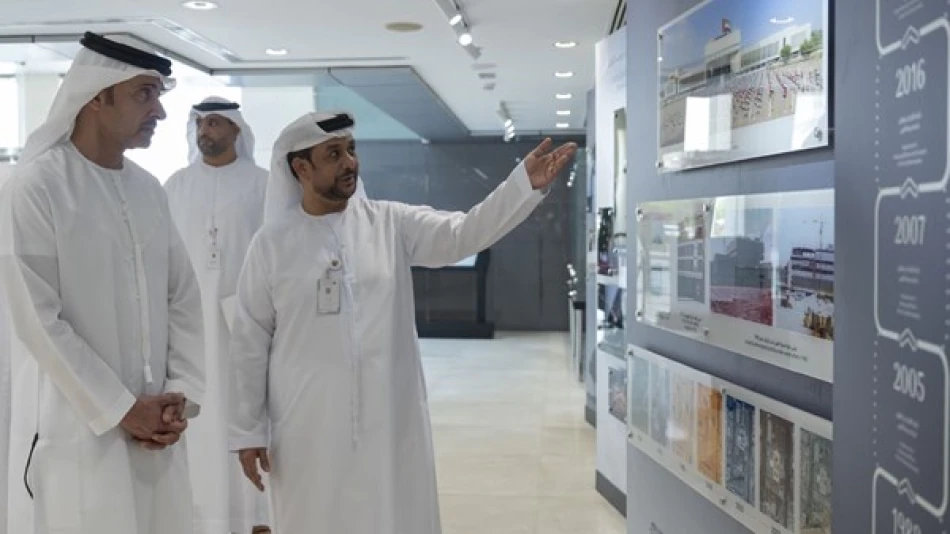
HH Sheikh Hazza bin Zayed Visits Al Ain Municipality, Reviews Key Development Projects
UAE's Al Ain City Positions Itself as Premier Heritage Tourism Hub Through Ambitious Development Blueprint
The UAE's Al Ain region is accelerating its transformation into a world-class cultural and tourism destination through a comprehensive development strategy that balances heritage preservation with modern infrastructure. Sheikh Hazza bin Zayed Al Nahyan's recent inspection of major municipal projects signals the emirate's commitment to positioning Al Ain as a sustainable growth engine that rivals established heritage tourism centers globally.
Strategic Infrastructure Projects Drive Economic Diversification
During his visit to Al Ain Municipality headquarters, Sheikh Hazza bin Zayed Al Nahyan, the Ruler's Representative in Al Ain Region, reviewed several flagship development initiatives designed to enhance the area's economic competitiveness. The Rawdah Square project represents a cornerstone investment in upgrading public infrastructure and facilities, while the comprehensive oasis development programs aim to preserve the region's agricultural heritage as a unique selling proposition for international visitors.
These projects reflect a broader Gulf strategy seen across the region, where traditional emirates are leveraging their cultural assets to reduce oil dependency. Similar to Saudi Arabia's NEOM project or Qatar's National Vision 2030, Al Ain's development blueprint emphasizes sustainable growth that honors historical identity while meeting contemporary economic demands.
The "Al Ain DNA" Initiative: Branding Heritage for Global Markets
The "Al Ain DNA" project represents an innovative approach to cultural branding that could serve as a model for other heritage-rich regions. This initiative aims to articulate Al Ain's unique identity through contemporary presentation methods that bridge historical authenticity with modern visitor expectations.
Tourism Investment Implications
For international tourism investors, Al Ain's positioning strategy offers compelling opportunities. The region's UNESCO World Heritage status, combined with systematic infrastructure improvements, creates a foundation for premium cultural tourism products. Unlike Dubai's commercial focus or Abu Dhabi's business tourism emphasis, Al Ain is carving out a distinct niche in experiential and educational tourism segments.
Old Neighborhoods Revitalization: Lessons from Global Best Practices
The municipality's focus on developing traditional neighborhoods while preserving their heritage character mirrors successful urban renewal projects in cities like Singapore's Chinatown or Istanbul's Sultanahmet district. This approach recognizes that authentic cultural experiences command premium pricing in global tourism markets.
The integration of modern services within historical contexts addresses a critical challenge facing heritage destinations worldwide: maintaining relevance for contemporary residents while attracting international visitors. Al Ain's model could influence similar projects across the Middle East and North Africa region.
2026 Vision: Positioning for Post-Oil Economic Leadership
The outlined projects for 2026 align with the UAE's broader economic diversification strategy under President Sheikh Mohamed bin Zayed Al Nahyan's leadership. These initiatives represent more than municipal improvements—they constitute a systematic effort to establish Al Ain as a sustainable economic hub independent of hydrocarbon revenues.
Regional Competition and Market Positioning
Al Ain's development strategy positions it to compete with established regional cultural destinations like Oman's Nizwa or Jordan's Petra. The emphasis on balancing preservation with modernization addresses a key differentiator: offering authentic heritage experiences with world-class amenities and accessibility.
The municipality's exhibition showcasing decades of civic achievements demonstrates institutional maturity that international investors and development partners value when evaluating long-term collaboration opportunities.
Implementation Strategy Signals Serious Commitment
Sheikh Hazza's direct engagement with municipal staff and detailed project reviews indicate high-level political commitment to these initiatives. This top-down support, combined with professional project management through the Abu Dhabi Centre for Projects and Infrastructure, suggests these developments will proceed on schedule and budget.
The presence of senior officials during the inspection, including Municipality Director General Rashid Musbah Al Manai and Engineer Maysara Mahmoud Eid, demonstrates the institutional coordination necessary for complex urban development projects to succeed.
Al Ain's comprehensive approach to heritage-based economic development could establish new benchmarks for sustainable tourism growth in the Gulf region, offering valuable insights for other cities seeking to monetize their cultural assets while preserving their authentic character.
Most Viewed News

 Layla Al Mansoori
Layla Al Mansoori






